
PERSUASION by Jane Austen
FRENCH LIEUTENANT’S WOMAN by John Fowler
Tut tut TUT.

PERSUASION by Jane Austen
FRENCH LIEUTENANT’S WOMAN by John Fowler
Tut tut TUT.

Alright chaps:
In which two novels does the seafront at Lyme Regis play a major role?
(Clue: both British authors.)
If you don’t know . . . tut, tut, TUT. Answer tomorrow.
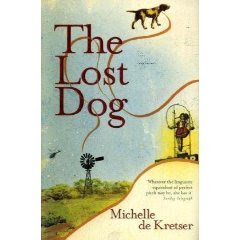
As you may perhaps grasp by reading the title, things didn’t go so well with me and Bolano’s 2666. I mean, I got to like 200+ pages, but I just couldn’t take it anymore. We went into a long section with a guy who was apparently a bit crazy. It was frankly rather dull. It’s boring because there is no cause and effect, and thus no plot movement forward or back. Nothing rational goes on, so there’s nothing to pay attention to – no line to latch on to and follow. And you just don’t care. He goes here, he goes there, he does slightly weird things, he hears voices, he feels sleepy, you get the gist. This is perhaps a true reflection of life for the mentally ill, but it’s also a true reflection of how to write a very boring book.
More though than it being dull – because I’ve ploughed through dull bits of books before, and it’s often been totally worth it for what’s coming – I found the entire tone of the book rather depressing. There seemed to be a general idea that life was crazy, and sad, and that no one was ever going to get anywhere – the critics, in the first section, with their love affairs and hunt for Archimboldi, and then the second section with the crazy guy. So I figured my crazy and sad life was too short for all that.
So onto THE LOST DOG by Michelle de Krester. This tells the story of a man who loses his dog. He is in the middle of some kind of half hearted love affair, and we cut back and forth between the love affair and the hunt for the dog. This is one literary-ass book. It is so literature I kind of want to barf a bit. It was full of images. There they are buying like whatever, noodles or something, and the noodle seller has . . . exquisite hands. Oh yes. Oh god. Part way through I just had to stop and read the author bio and the back flap, and what do you know, she is a professor of English Lit. Barforama. But other than that it was okay. And don’t worry I’m still also on Trollope’s DR THORNE. More on this later.

So as I said I’m reading DR THORNE. 2666 is my bus and bedtime book, and DR THORNE’s what I read at work. I’m reading it on the truly fabulous gutenberg.net, my friend through many a tedious temp job. Once I managed like 3 Balzac novels in 3 weeks. It was wild.
So this is the third of the Barchester novels, the first two being THE WARDEN and BARCHESTER TOWERS. I’ve certainly read one if not both of the previous, so decided to give this a go. I LOVE me some Victorian novelists. I love the assurance of their writing, and especially the sense that there is a definite plot to life, that proceeds logically and with meaning. This is nothing at all like real life, and that’s obviously what’s fabulous. I only realised that this was why I found the Victorians so comforting when I read THE MILL ON THE FLOSS (George Elliot). I don’t want to spoil it for you if you haven’t read it, so let’s just say that there’s something that happens on the penultimate page that you have in NO WAY been prepared for and makes NO SENSE. ie, just like real life. This is not what we read the Victorians for. So, advice, don’t be reading the end of THE MILL ON THE FLOSS in public, as someone reading this blog may have been, as it is HECTIC.
I also like the scope of their ambition, and their energy – writing hundreds of pages, covering tens of characters – it’s bracing. It’s sort of like all their bridges and buildings and railways: just massive cultural energy. Do you know, at the V&A Museum here in London, you can see the entire front of medieaval French church, cast in plaster in France and shipped here in bulk. They did this sort of shit a lot in the days before people could travel. They just decided to bring the world to them, so there’s also David (complete with unnecesarily large fig leaf for when royalty visits) and Trajan’s Column and stuff, all in the same room. These Victorians are crazy.
So anyway, this novel is about a country doctor, Dr Thorne.
Or is it? As Trollope writes: “The one son and heir to Greshamsbury was named as his father, Francis Newbold Gresham. He would have been the hero of our tale had not that place been pre-occupied by the village doctor. As it is, those who please may so regard him. It is he who is to be our favourite young man, to do the love scenes, to have his trials and his difficulties, and to win through them or not, as the case may be. I am too old now to be a hard-hearted author, and so it is probable that he may not die of a broken heart. Those who don’t approve of a middle-aged bachelor country doctor as a hero, may take the heir to Greshamsbury in his stead, and call the book, if it so please them, “The Loves and Adventures of Francis Newbold Gresham the Younger.”
I just love this. I love the fact that he tells you plainly that he’s too old for heartbreak. It’s very charming. And not at all pretentious. So far, we’ve followed the Doctor adopting his illegitimate niece after his brother dies in unpleasant circumstances. The niece, Mary Thorne, is included with the children of the local squire in their education, and now she seems to be on a collision course for romance with the squire’s son, Francis Newbold Gresham – thankfully called Frank – referred to above.
I will keep you updated. But, just fyi, let me point out that Trollope was one of the most prolific authors of all time, all the while also working for the Post Office, and not in a minor way either – he was responsible for the invention of the red post box. He used to write on trains during his long commutes. Ponder my dears if in comparison you are achieving enough. I THINK NOT.
I’m still plouging through 2666, and still constantly on the verge of giving up on it.
I also confess I’ve started Trollope’s DR THORNE, the third of the Barchester novels. I’ve read the first two I think.
But just for a moment, can we talk about this guy and his book, reviewed in the Guardian. He’s a Nobel winning economist, and writing about the financial crisis. What I find hilarious in his analysis is the part where he says that those people doing most of the financial bungling were “third rate graduates from first rate universities.” I think that is SO TRUE. Honestly, my recollection of those doing Economics at my university were not that they were the largest brains I knew on campus – just that they were the people most interested in make money. Is it any surprise at all it’s all gone totallly tits up? Geez.
Here’s the link http://www.guardian.co.uk/books/2010/jan/30/freefall-global-economy-joseph-stiglitz
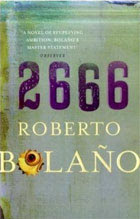
Either there are going to be a lot more posts on this one, or hardly any. It’s a GIANT. Now, I like big books, but only big books that I like. If you know what I mean. And speaking from pg 137, where I am, I’m not sure I like this one.
It tells the story of four academics who are all interested in a German writer called Archimboldi. We learn all about his books, their papers on the themes in his books, etc etc, but the bulk of the story (so far anyway) is about these four attempting to uncover more about the writer’s personal life. He hasn’t been seen in years, and no one knows where he lives, how he looks, or anything about him; at best they hear snippets from people who may have met someone who might have been him. I’m becoming extremely suspicious that Archimboldi is ye-olde-time-honoured-metaphor for human meaning.
All the contradictory stories about him, and the earnestness with which the four search, are I suspect supposed to be amusing, in a sort of high-brow, aren’t we post-modern, watch me have fun with your expectations of plot kind of way. I have to say, it’s not killing me so far.
There are some truly fantasic parts. Like, early on, “If violition is bound to social imperatives, as William James believed, and it’s therefore easier to go to war than it is to quit smoking, one could say that Liz Norton was a woman who found it easier to quit smoking than to go to war” Love it. Very interesting.
Or this. It’s from a section where two of the academics are discussing the fact that they seem to have both fallen in love with a third. “The first twenty minutes were tragic in tone, with the word fate used ten times and the word friendship twenty-four times. Liz Norton’s name was spoken fifty times, nine of them in vain. The word Paris was said seven times, Madrid, eight. The word love was spoken twice, once by each man. The word horror was spoken six times and the word happiness once (by Espinoza). The word solution was said twelve times. The word solipsism seven times. The word euphemism ten times. The word category, in the singular and in the plurual, nine times. The word structuralism, once (Pelletier). The term American literature three times. The words dinner or eating or breakfast or sandwich nineteen times. The words eyes or hands or hair fourteen times.” You get the idea.
There’s also a great section about exile being useful because it destroys fate.
But I’m finding it hard to get into, overall. Like, this love triangle: he sort of tells us about it, but at sort of one remove; so for example all the characters are referred to by their last names all the time. It’s like reading the outline of a soap opera sometimes: salacious and dull at the same time. There are also LOTS of dream sequences, apparently quite unrelated to anything else. I was very virtuous and read the first five or six, but am now skipping them. I’m persevering because this is one of those books with two pages of quotations from reviews, and not just “I liked it” but “the first novel of the twenty first century” “Bolano has redefined the novel” “a stupendous achievement.” Now, I’m always very suspicious any time the novel has been redefined that it’s all going to be word games and dream sequences, and we see I was half right – but let’s keep trying. Say like page 200, and make a judgement then as to whether to keep going?
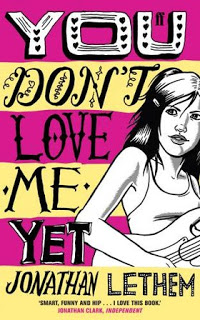
This book was pretty much pants.
“Smart, funny and hip . . . I love this book” said the Independent. A publication that clearly needs to smoke a good deal less crack. There were lots of other similar reviews. Many emphasized the books ‘coolness,’ and my theory is that many of the reviewers were sort of older – like maybe in their fifties. As this is a book clearly written for/about people in their twenties and thirties, the reviewers must just have thought that while the book was blantantly crap, that crap must be how the kids roll these days. Let me tell you what, we definitely don’t roll as follows: “…. the indolent hours unfurled”. What the hell IS that?
Essentially the novel told the story of Lucinda, a 29 year old in a band that is on the cusp of success. The book opens with her having just broken up with the band’s lead singer. She then gets involved in a strange, not very believable and very sexual relationship with an older man(maybe that’s why the critics like it). Meanwhile, her ex-boyfriend has abducted a depressed kangaroo from his day job at a zoo. Surprising though this plot line sounds, it goes nowhere. Eventually the relationship with the older man kind of fizzles out and she ends up back with the lead singer.
I really can’t think of anything much I like about this book. Particularly irritating was the way the book and the characters are both so totally in love with the idea of the hipster, and with themselves as hipsters. Also irritating was the way people never eat in this book, they only ever ‘gobble’ or ‘wolf’ or ‘choke down’ or ‘slurp.’ Yuck. Anway, it was only like 223 pages. Onwards and upwards.
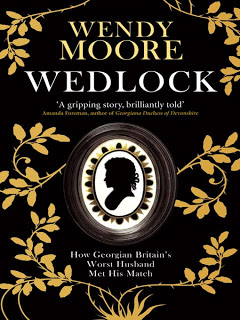
A rare burst of non-fiction.
This book tells the story of Mary Eleanor Bowes, a woman of the seventeenth century, who was the wealthiest heiress in England, and possibly in Europe. At one point a certain Capt Stoney defends her honour in a duel, and she is assured by multiple medical men that he is about to die. His dying wish is to marry her, and in a burst of romance, she does so. Hours after the ceremony, he miraculously recovers.
He then starts to spend her money with a vengence. He does other things with a vengence too, such as beat her up. As is common in domestic violence situations, it gets worse and worse. Eventually, she’s not allowed to move from one room to another without someone escorting her. She’s not allowed out, even to her beloved greenhouses in her own garden. She was a noted naturalist, and funded one of the first botanical expiditions to the Cape. (She was in fact responsible with this trip for proving the existence of giraffes to Europeans – previously these had been thought to be mythic. She donated the carcass to John Hunter, of the Hunterian museum here in London. He cut off it’s legs and left it in his entryway to boggle his guests’ minds).
Stoney was intent on convincing people that he was the long-suffering and caring husband of a strange and eccentric wife, so he’d give her instructions, before dinner parties, for example that she could only say ‘yes’ or ‘no’, no matter what was said to her, or had to remain totally silent and so on. So people thought she was crazy. He also didn’t let her get any new clothes, so she was virtually in rags, and barely let her eat. Meanwhile he spent her money with gay abandon. The phrase ‘stoney broke’ actually comes from him. When his younger sister came to live with them (though her parents tried to dissuade her, as even they knew he was crazy), he controlled her too, not letting her out at all. She eventually escaped after three years and fled back to her parents in Ireland.
Eventually it got so bad Mary genuinely thought she was going to die. Peviously, all the maids had been handpicked by him, and most were his mistresses, either willingly or unwillingly (ie, he was also a rapist). On this occasion however he’d let someone else choose a maid, and that person, Mary Morgan, was well educated and tough. Usually he chose very ill educated poor people. So anyway, this lady clocks what is going on, and she and two other maids organise for Mary to escape. So they leave the house too, without any pay, and hide her in their slum homes. She then finds a lawyer, willing to fight her case on a no-win no-fee basis.
She stays in hiding while her case proceeds, but eventually Stoney manages to abduct her – in broad daylight, on a busy London street. This is too much even for the very sexist legal structures of the day, and they are swiftly pursued. As he runs, dragging her around the country, the poor woman is so determined to die rather than have anything further to do with him, that she manages to stand up to him. At one point he says he will shoot her if she doesn’t sign a renunciation of her legal claims, and she basically says “Shoot and be damned” – which he does, but luckily for her it’s a misfire.
So eventually they are found, and she gets her divorce – one of the first in England – laying down an important precedent, that while it was okay to beat your wife(!) it wasn’t okay to beat her to a pulp. In jail, let me tell you, this Stoney guy gets some twenty year old girl interested, and KEEPS HER LOCKED UP IN A CELL WITHIN A CELL for twenty years. Very Austrian basement. No one sees her, she has five kids. Now this I think merited a novel in itself, but I guess there’s less research material to base a book on with a very poor, illiterate woman than with this Mary. Even Mary’s school books survive, and small things – such as, for example – the note she managed to scribble while she was being abducted. (Naturally Stoney tried to claim she wanted to be abducted, later, at the trial, so this was important evidence)
100 points to Wendy Moore for keeping the story really gripping. I was up till 2am. It was also a good reminder of what people have suffered to get women to where they are today. So all those girls today who who go out with the intention of being bought drinks all night, or who aspire to be Page 3 girls, or whatever. BE ASHAMED.
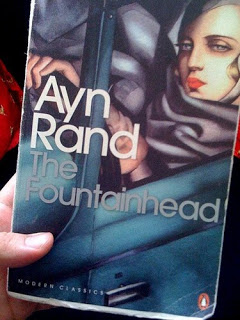
Well, this was a doozy. I keep meaning to read something by her, because she’s someone one has heard of, not so much in a literary quality way as in a slightly weird self-help kind of way. I sort of associate her with slightly overweight, long haired kind of men. I think we know who I mean.
The book tells the story of one Howard Roark, who is an architect absolutely committed to following his artistic vision. He is willing to be kicked out of school, lose jobs, lose big contracts, be reduced to penury, etc, rather than sacrifice one iota of his vision. It was in some ways quite inspiring. Her basic thesis is that everyone’s only duty is to themselves, and to be true to their view of the world. She argues that the hardest thing in the world is to do what you want to do.
She contends that religion aims to keep us under control, and that the way to do this is to keep us unhappy. It therefore teach us that self sacrifice is to be valued and admired, while she believes self-sacrifice is killing the only thing in the world that is real for us: the self. She also thinks religion aims to make us unhappy by convincing us we are wrong or evil. Roark at one point is commisioned to build a temple of all faiths, and is taken to court when he builds not a soaring monument, taking us away from ourselves and up, but something built to the scale of the human form, and celebrating the human scale.
At the end of the book, he is taken to court once again, for blowing up one of his own buildings, because it was not built exactly to his specifications. There, the people in the court are struck by the way he stands as a man ‘innocent of fear.’ They are reminded of occasions when they have suddenly thought of what they should have said in such-and-such a situation, of who they are in their minds, shining and incorruptible, before they are in real life shackled by fear. He is presented as an example of who we could be if we lived without compromise, and without need for other people.
There are some fantastic bits, like her contempt for people who would rather give money to a ‘pregnant slut’ than a ‘starving man of genius.’ Appallingly sexist, but fabulous. You get the distinct impression that Ayn Rand may have struggled as a writer for quite some time, and had to stick to her guns with some ferocity, as she is really big into the idea that you are to be judged only by how much you love your work, and how hard you stick at it, basically: don’t let the bastards get you down. There is something very freeing about her idea that success is not gauged by others’ opinions, or even by your own outer achievements, so much as it is about you holding firm in your own mind.
So, some interesting ideas. I found it a quite gripping read, which surprised me really, as the book is not exactly notable for it’s literary style. In fact, it’s kind of badly written. Coincidences abound. Cliches most definitely abound, and abound everywhere. Characters are sort of interchangable. Weirdly, given that the author is a woman, and must have been quite an exceptional woman, it’s quite sexist. It absolutely adheres to the stock style: male as centre of the plot, virgin/whores left and right, evil mother crushes genius. There is one strong-ish female character, who I strongly suspect is Ayn. But she’s devastatingly beautiful, blonde hair, blah blah. Oh yes, and she enjoys being raped, in one unforgettably weird chapter. Oh yes, my friends, the book has dated in several ways. Not least the name Howard. It’s hard to take that name seriously for the ideal man.
I think the strength of the book, what keeps pulling you in, when your good taste tells you to get out, is the fiery power with which she believes in her idea, and her desire to have you believe it too. It’s an unusual idea, and I think (viewed in the right light) an empowering one. It’s rare to come across a book that wants to change your life.
Though the above would be a good ending, I just have to say: it is kind of elitist. Also I suspect it could be used, and probably has been used, for some dubious ends. Eg. at one point she says that the whole movement of culture, away from ‘savagery,’ is a movement towards privacy for individuals. Yikes.
So yes, basically, I find it encouraging that David Sedaris wasted that much of his life and still seems to have got somewhere. Not that I’m some big druggie, but I’ve certainly wasted my fair share of time here and there.
I find Sedaris’ use of language strangely brilliant. I’ll laugh out loud at a sentence, and then spend ages trying to understand what about that turn of phrase made it so funny. It’s less about the comedy of incident,and more about the comedy of language, which is SO DIFFICULT. So well done that man.
He does on occasion try, especially at the ends of his stories, to give us a kind of literary thrill, or a sense that he’s been talking about something larger than we at first thought. This is only sometimes successful.
Disclaimer: Okay, I skipped some stories this time round. I really didn’t feel I could handle the death ones. Maybe when I know you better I’ll tell you why.